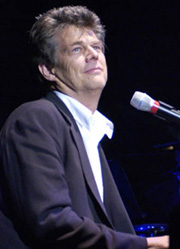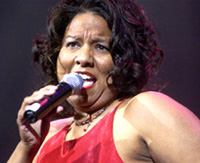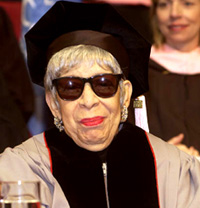Feature Story
Keys to Success
Producer David Foster joined students on stage to help make Commencement 2002 a memorable one.
Near the end of Berklee's commencement concert on May 10, vocalist Alisa Miles walked to the front of the stage, shaded her eyes from the spotlight, and squinted into the Berklee Performance Center audience. She was looking for commencement honoree and producer/composer David Foster, who was sitting about 20 rows from the front.
"Mr. Foster, are you out there?" she said in a sing-song voice as if she was playing a game of hide-and-seek. After Foster stood and the applause rose then died down, Miles issued an invitation to the 14-time Grammy Award winner. "We think it would be quite cool if you came up and played a song for us," she said. Egged on by the crowd, Foster quickly left his seat, climbed onto the stage, and after saying a few words, settled in at the grand piano.
"It's going to be stupid to play when everybody in this room plays better than I do," Foster said, a nod to the string of outstanding performances he had just witnessed. But when Foster joined Miles and the student band for "Through the Fire," the 1984 hit he wrote for Chaka Khan, he played as if he, too, had been rehearsing for days prior to the concert. And though Foster is known more for behind-the-scenes work, his decision to join students on stage electrified onlookers the same way commencement honorees Natalie Cole and Phil Collins did when they performed with students in the 1990s.
The students themselves provided plenty of excitement during the two-and-a-half-hour tribute to Foster and fellow honoree jazz singer and pianist Shirley Horn. The concert began with Hiromi Uehara and Oliver Rockberger facing each other at the stage's two pianos as the pair played a medley of tunes made famous by the honorees.
The pianists' contrasting styles—Uehara played a nuanced mix of classical and jazz styles while Rockberger's pop-oriented flourishes were sometimes brash, sometimes humorous—made for a nice opening to a concert honoring two people who also carved out very different corners of the musical universe at their respective keyboards.
Alisa Miles sings lead on "Some of My Best Friends Are the Blues." Justin A. Knight
Among the Foster-penned hits on the program were Chicago's "You're the Inspiration," a duet featuring Gina Cuchetti and Claude Kelly; the Tubes' "She's a Beauty," an early 1980s rocker belted out by Jason Joseph; and Celine Dion's "To Love You More," a ballad that Allison Bordlemay infused with emotional power as Morwena Lasko accompanied her on violin. Uehara and Rockberger returned to lead the band through a medley of Foster's movie themes, including music he wrote for "The Secret of My Success" and "St. Elmo's Fire."
Several vocalists paid homage to Horn by performing standards she began recording in the early 1960s. In "Here's to Life," Marianne Solivan's smoky voice, world-weary tone, and use of space between notes were gentle nods to the way Horn guides listeners through the stories in her songs. Accompanied by a quartet and accordionist Victor Prieto Cruz, Nia Allen revealed both jazz and r&b influences in her rendition of "Summertime," displaying a strong voice and an ability to embody the darkness and light of the lyrics. Cruz took a solo and, at the end of the song, traded riffs with Allen, an interplay that recalled Horn's work with harmonica player Toots Thielemans.
The morning after the concert, 3,000 people attended Commencement 2002 at Boston's Reggie Lewis Track and Athletic Center. Members of Berklee's largest ever graduating class—662 students—filed into the hall and eventually collected diplomas and handshakes from Horn and Foster.
The student speaker was Shawn Madden, a Professional Music major who reminded his fellow graduates about the importance of following through on musical dreams and plans, citing his own decision to present a live performance of the Beatles' "Abbey Road" at Berklee in 1999. Foster delivered the commencement address, focusing on the persistence, networking, and openness required for having a successful music career.
"Don't be a musical snob," said Foster, whose list of credits includes names like Madonna; Paul McCartney; Earth, Wind & Fire; and Night Ranger. "I guarantee you that Kenny G and Herb Alpert are just as fulfilled as John Coltrane and Miles Davis. All of them got to play their own music exactly the way they wanted and all of them got to maximize their musical capabilities." As a teenager, Foster said, he was fired from bands led by Chuck Berry and Neil Diamond because he "had no respect for music that only had a couple of simple chords in it."
Shirley Horn called the commencement concert "great music." Justin A. Knight
Once Foster overcame his youthful cockiness, he found that hard work and a good attitude were the keys to advancing his career. The same formula that worked for him will work for Berklee's graduates, he said, adding that new technologies and media are providing new opportunities for musicians.
"There's always going to be an audience for good music," Foster said. "There are 500 T.V. channels and they all need content...it's all there for the taking...but please don't worry about how many notes you can put into a bar. Worry about how long your music will be around after you're gone."
After Horn received her honorary doctor of music degree, she took the microphone and told students that she had been deeply affected by the concert on commencement eve.
"It made me very proud to say 'I am a musician. I'm one of you.' And I wish you godspeed. Be smart, but go get 'em. You're wonderful," she said.
For Foster, the only thing more impressive than the students' playing ability was the way they cheered on their fellow students.
"This is certainly an amazing array of talent you have here," he said just before his performance at the commencement concert. "There's something I witnessed here tonight that is actually more extraordinary than the musicianship. That is the support that all of these students (pointing to audience) gave to all of these students (pointing to performers). That is the winner right there."


